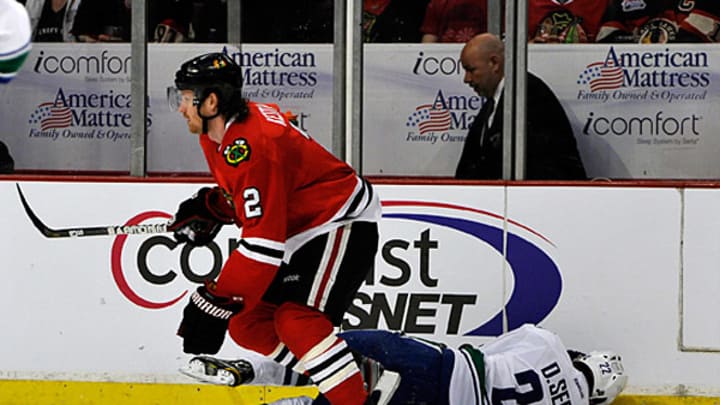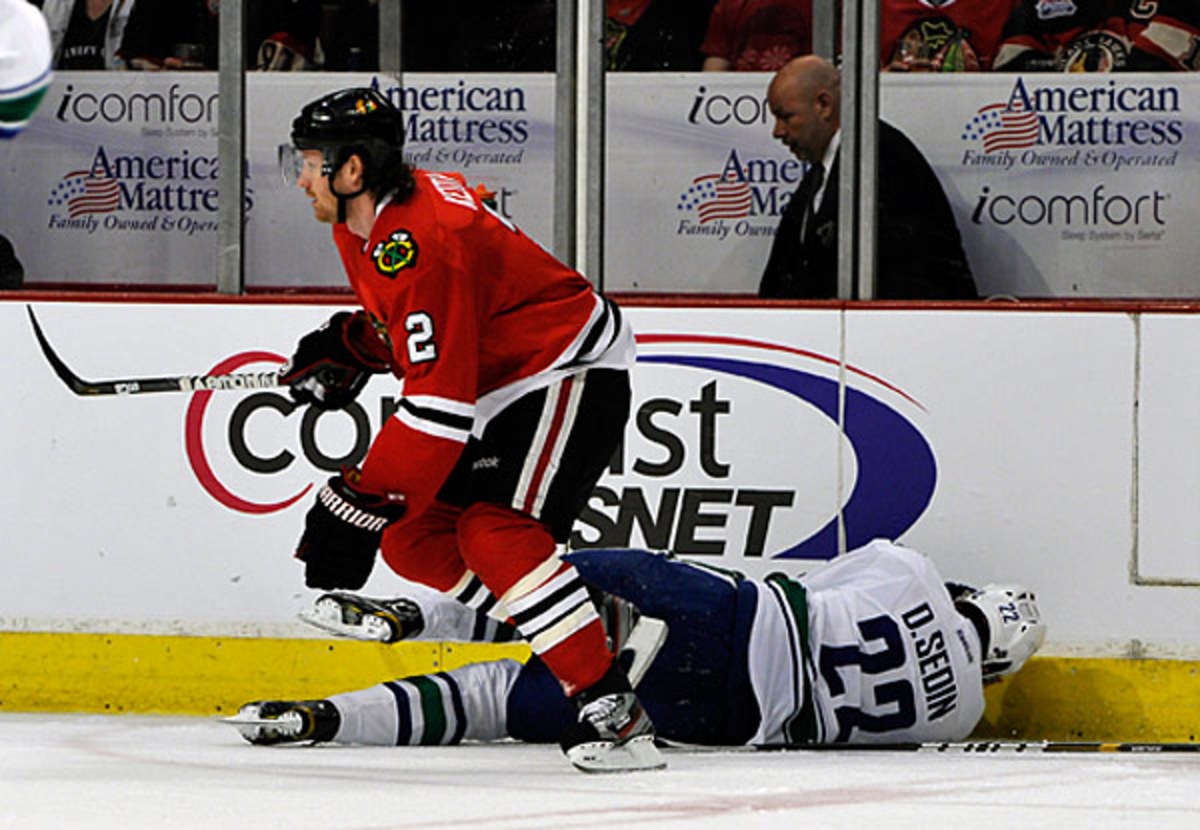Leniency makes for a dangerous game

The on-ice call after Duncan Keith's elbow to the head of Daniel Sedin, an illegal shot that could change the course of the Western Conference playoff race, was unfortunately lax. (Warren Wimmer/Icon SMI)

By Stu Hackel
Duncan Keith, the Blackhawks' top defenseman, had a phone hearing with Brendan Shanahan on Friday for his elbow to the head of the Canucks' Daniel Sedin, which concussed the Vancouver star and took him out of the lineup indefinitely. There's widespread speculation that Keith will receive a relatively stiff suspension, since the league asked for an in-person hearing as opposed to over the phone. That's the procedure the NHL uses when it believes the ban could exceed five games, although Keith waived his right to appear.
If he's suspended, and it seems certain he will be, it will likely be for longer than the three games Shane Doan got for the elbow he threw at Jamie Benn earlier this week.
UPDATE: Keith received a five-game suspension from the NHL.
It's hard to know where to begin when discussing the Keith-Sedin incident. It was a far more intentional head shot than anything Sidney Crosby suffered. We briefly mentioned on Thursday the potential impact the hit and suspension could have on the playoff race and also how mind-boggling it is that elite players like Keith and Doan would play so recklessly or lose their composure in such a manner. It's also worth pointing out that these incidents involved important players on the opposing teams. One wonders how long the NHL will continue to stomach this stuff.
These episodes lead to questions about the effectiveness of the NHL's law and order system. As we've said for a long time, the NHL's soft punishments fail to deter -- and may even encourage -- illegal, dangerous and injurious plays.
Let's start by looking at the Doan-Benn episode from Tuesday, a drive-by elbow that Doan delivered just as Benn had gotten rid of the puck.
The fact that Doan was judged to have done this with less malice than instinct, and that Benn wasn't hurt on the play, contributed to the punishment being only a three-game ban. But what of Doan's status as a repeat offender? Not only did he get a three-game ban for a late blindside hit in October 2010, he'd been fined five days earlier for a dangerous play. What happened to all this talk about stiffening the penalties against recidivists?
When Rene Bourque, then of Calgary, took out Washington's Nicklas Backstrom in January with a similar drive-by elbow, Shanahan gave Bourque five games. Lots of people complained that response was too soft. Backstrom hasn't played since.
Bourque, too, was judged to have reacted more with instinct than malice, but he's a repeat offender who had just come back from the suspension he'd received 16 days earlier. Yes, his victim was hurt. But for all the league's talk that an injury has to play into the length of a suspension, is that all a potential season-ending concussion is worth? Two extra games?
Too often this season, Shanahan's new era player safety ethos has reverted back to the old Campbell era "boys will be boys" leniency. That forgiving attitude the NHL's disciplinarians have too often displayed has spread to the ice this season. Both Doan and Keith received only minor penalties for their crimes when they should have gotten majors and game misconducts.
Regular readers know I almost never complain about officiating here. These guys have a tough job, they do it well, and most often they're right far more than fans believe. Increasingly, however, soft calls and non-calls have plagued the game. What should be majors end up as minors (which the league corrects when the players get suspended), and calls that should be minors are excused entirely, sometimes with bad consequences.
You don't have to go too far back -- just last week -- to see those consequences, like when the Sabres' Tyler Myers boarded the Canadiens' Scott Gomez and earned a three-game suspension.
[vodpod id=Video.16264246&w=425&h=350&fv=catid%3D-7%26amp%3Bid%3D164475%26amp%3Bserver%3Dhttp%3A%2F%2Fvideo.nhl.com%2Fvideocenter%2F%26amp%3Bpageurl%3Dhttp%3A%2F%2Fvideo.nhl.com%2Fvideocenter%2F%26amp%3Bnlwa%3Dhttp%3A%2F%2Fapp2.neulion.com%2Fvideocenter%2Fnhl%2F]
That should have been a major and game misconduct, but Myers got only two minutes. He stayed in the game and eventually scored the winning goal in overtime. Supplemental discipline can't correct that.
Doan also got a minor and stayed in the game. He should have gotten a major and been tossed. Instead, he collected a pair of third-period assists after the foul and sent the game to overtime. The Coyotes lost, but got the single point for the regulation tie, and in this tight Western race, every point counts.
Most egregiously, Keith responded to an unpenalized shoulder-to-head check that Sedin threw earlier by delivering a flagrant elbow that can't be ruled instinctive. He got only a minor.
With Keith remaining in the game, the Canucks spent the entire second period chasing him around, trying to avenge the hit. "They basically turned the second period into one prolonged scrum and expended considerable energy trying to get at Keith," observed Ed Willis of The Vancouver Province. "True, they didn’t succeed — their best work was a goal-mouth scrum started by Zack Kassian that ended in a dogpile on the Blackhawks’ defenseman — but, like the final score in this one, that was beside the point."
When the final score is beside the point, we have a problem, one that would not have developed had Keith gotten tossed.
It would be a big stretch to say that Doan getting off easy made Keith believe he would, too. It's possible that Keith wasn't even aware that Doan only got three games. But it's no stretch at all to state that the league's previous suspensions, which have rarely been more than a few games, didn't serve as any sort of deterrent to Keith at all. And on the ice, the officials didn't help deter anyone, either.
"The officials are the first line of defense in enforcing an acceptable standard on all rule infractions," Kerry Fraser wrote on his TSN.ca blog, delivering his usual excellent analysis of what transpired in this instance. "How they employ this standard across the board goes a long way to act as a deterrent for player willingness to break the rules and more importantly in providing for player safety."
Fraser goes on to discuss the need for the Player Safety group to work more closely with the league's officiating function.
"The official's ability to accurately differentiate between minor and major infractions on the ice is vital to the success of controlling (and hopefully someday eliminating) dangerous hits and deliberate hits to the head of an opponent," he continues. "Game enforcement is not only a most visible sign to participants in that specific game, but to the hockey community at large as to what is deemed acceptable conduct.
"In too many situations witnessed this season, the officials have either missed the mark altogether or came up short by at least three minutes plus a game misconduct. The judgment of the referees needs to be collectively and immediately retooled by NHL V.P. of Officiating, Terry Gregson, to conform to a higher standard that is currently being maintained by the Player Safety Committee."
That assumes the league actually wants a safer game, one that does all it can to limit hits to the head. Of course, if it wants to drive on the wrong side of the road, preferring mayhem and danger because they believe it keeps interest high and sells tickets, well, then there's no reason to change anything at all.
COMMENTING GUIDELINES: We encourage engaging, diverse and meaningful commentary and hope you will join the discussion. We also encourage, but do not require, that you use your real name. Please keep comments on-topic and relevant to the original post. To foster healthy discussion, we will review all comments BEFORE they are posted. We expect a basic level of civility toward each other and the subjects of this blog. Disagreements are fine, but mutual respect is a must. Comments will not be approved if they contain profanity (including the use of punctuation marks instead of letters); any abusive language or personal attacks including insults, name-calling, threats, harassment, libel and slander; hateful, racist, sexist, religious or ethnically offensive language; or efforts to promote commercial products or solicitations of any kind, including links that drive traffic to your own website. Flagrant or repeat offenders run the risk of being banned from commenting.
